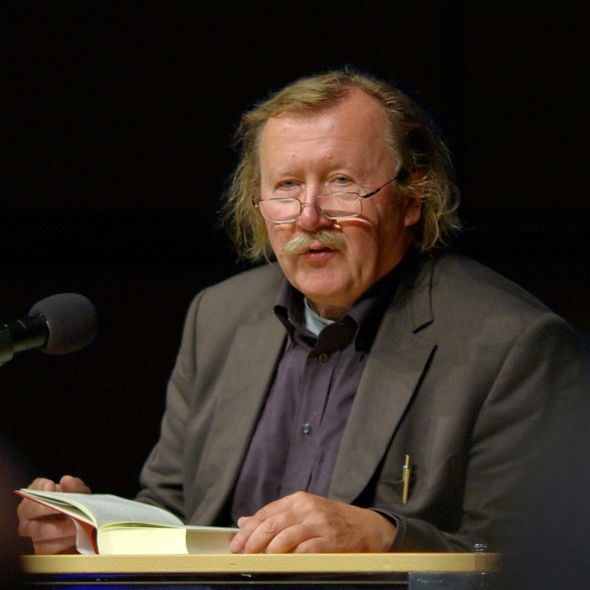"I Am Not a Man, I Am Dynamite": Peter Sloterdijk on Nietzsche
May 17, 2018
:quality(75)/https%3A%2F%2Fdev.lareviewofbooks.org%2Fwp-content%2Fuploads%2F2018%2F05%2F1_f8UNQC8bmDzkjZU42QPgpA.jpg)
Listen to the episode
"I Am Not a Man, I Am Dynamite": Peter Sloterdijk on Nietzsche
00:00/00:00
“It's very hard to conceive of a sane god.”
Peter Sloterdijk is one of the most controversial thinkers in the world. In many ways, he is the heir of Friedrich Nietzsche, who is sometimes said to have inaugurated the 20th century. Host Robert Harrison opens his discussion with Sloterdijk with the sound of an explosion, and Nietzsche's words, “I am not a man, I am dynamite.”
Sloterdijk says the words had helvetic echoes, since Switzerland was the first to blast a passageway through the Alps to tunnel new passages to Greece: “That is the metaphysical question for all these northern peoples. How can we win back an easier access to the Mediterranean truth, the really big dream-essence?”
Yet Nietzsche had his own access to the Greeks — and had the dynamite within him. In particular, he was the first to ask what meaning Dionysius might have for us. Nietzsche's whole life work was an effort to uncover the meaning of the non-Olympic god who is “something to come, and something already present.” Nietzsche sought to discover how “the dismembering of Dionysus and his suffering recreates the world and makes a new form of social synthesis possible,” according to Sloterdijk (who was bravely battling a cold during the conversation).
“Nietzsche was right, to certain extent, when says 'my soul should have been a singer rather than a writer.' What he did in his later days was exactly that. That's why Nietzsche later became, especially in Zarathustra, 'the singer of a metaphysics of high noon.'” Sloterdijk calls that passage a European answer to the enlightenment of Buddha under the bodhi tree: “He describes the messenger as a person sleeping in the grass under a tree and tied to life only with a very thin thread. You must not move. Dionysus is there. Don't even breathe. The world has become perfect. He's looking for the moments when he was able to bear the burden of his divine predicament.”
“Nietzsche was among the very rare thinkers who had a feeling that there is a deep connection moral philosophy and public relations. This can be shown in the subtitle of Zarathustra — a book for all and nobody. Ein buch für alle und keinen." It's a mark of Nietzsche's genius. He was acting as a kind of “action teacher,” and discovered a higher morality in writing a book for everyone and no one, a path between animal and the superman. Nietzsche likens it to a rope-walker.
“He sees the ropewalker. He has fallen down. He says, out of danger you made your profession. There is nothing despisable in that. And for that reason I am going to bury you with my own hands. It's not success that decides everything, it is the will to remain within the movement and to walk on the rope.”
“There is a deep hilarity in wisdom.”

Philosopher and cultural theorist Peter Sloterdijk has been called a “celebrity philosopher,” and is one of Germany's foremost thinkers. From 2001 to 2015, he was the rector of the State Academy of Design at Karlsruhe, where he has been a professor of philosophy and media theory since 1992. From 1989 to 2008 he was director of the Institute for Cultural Philosophy at the Academy of Fine Arts Vienna. He co-hosted the German television show Im Glashaus: Das Philosophische Quartettfrom 2002 to 2012.
His books include: Critique of Cynical Reason (1983), Thinker on Stage: Nietzsche's Materialism (1986), The Spheres Trilogy (1998, 1999, 2004), Rage and Time (2010), Nietzsche Apostle (2013), You Must Change Your Life (2013), and Not Saved: Essays after Heidegger (2016).
In 2016, he taught a four week seminar at Stanford University on the philosophical implications of cynicism, with particular focus on his book Critique of Cynical Reason, a thousand-page book that sold more copies than any other postwar book on German philosophy.
A recent profile of Sloterdijk was recently published in The New Yorker.
Did you know LARB is a reader-supported nonprofit?
LARB publishes daily without a paywall as part of our mission to make rigorous, incisive, and engaging writing on every aspect of literature, culture, and the arts freely accessible to the public. Help us continue this work with your tax-deductible donation today!